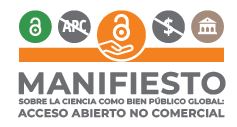The sociocritical research method: subjectivity and complexity
DOI:
https://doi.org/10.5281/zenodo.12627481Keywords:
Subjectivity and complexity, socio-critical method, pragmatic alternative, dualismAbstract
The purpose of this research was to study the socio-critical method of research, as an integration of subjectivity and complexity. To achieve this objective, an investigation was carried out within the epistemic approach called postpositivismo; qualitative paradigm and a type of interpretive research with bibliographic design, documentary observation being the technique for collecting information. On the other hand, as a result, qualitative research in social disciplines is prone to the application of methodological dualism, since they are based on personal inferences and subjective judgments. Likewise, the conclusion is that they are relevant in the socio-critical method; They start from personal inferences and subjective judgments; Furthermore, they do not seek to establish a consensus within a research community, but rather to emerge as a pragmatic alternative to the need to understand a complex reality.
Downloads
References
Álvarez, N. et al (2023). Posturas del paradigma socio-crítico como aportes a la educación y gestión educativa en Colombia. Revista Dialogus, Año 6. Número 10. https://revistas.umecit.edu.pa/index.php/dialogus/article/view/678
Barbosa, L. et al (2015). Los paradigmas de la modernidad y posmodernidad y el proceso de cuidar en enfermería. Revista Enfermería Global Nº 37. https://scielo.isciii.es/pdf/eg/v14n37/reflexion2.pdf
Fabro, A. (2012). Evolución histórico–filosófica del pensamiento científico. Su aporte a la enseñanza de las ciencias experimentales. Revista Aula Universitaria 14 año 2012.
Galati, E. (2017). El pensamiento complejo y transdisciplinario como marcos de investigación científica. Revista Latinoamericana de Metodología de las Ciencias Sociales, Numero 7, Volumen 1.
Grijalba, J. et al (2020). La formación del pensamiento sociocrítico y sus características: necesidad educativa en Colombia. Revista Universidad y Sociedad, Numero 12, Volumen1. http://scielo.sld.cu/pdf/rus/v12n1/2218-3620-rus-12-01-64.pdf
Hernández, N. (2020). La ciencia en la posmodernidad: el caso de Rorty y Lyotard. Revista Tópicos de Filosofía, 58. https://www.scielo.org.mx/pdf/trf/n58/0188-6649-trf-58-291.pdf
Miranda, S. y Ortiz, J. (2020). Los paradigmas de la investigación: un acercamiento teórico para reflexionar desde el campo de la investigación educativa. Revista Iberoamericana para la Investigación y el Desarrollo Educativo. Vol. 11, Núm. 21. https://www.scielo.org.mx/pdf/ride/v11n21/2007-7467-ride-11-21-e064.pdf
Pierre, J. (2021). El pensamiento binario. Aspectos semánticos, teóricos y empíricos. Revista Recherches Sociologiques, Vol. XXXII, 3. https://www.scielo.org.mx/pdf/crs/v3n6/v3n6a2.pdf
Quintana, L. y Hermida, J. (2019). La hermenéutica como método de interpretación de textos en la investigación psicoanalítica Perspectivas en Psicología. Revista de Psicología y Ciencias Afines, vol. 16, núm. 2. https://www.redalyc.org/journal/4835/483568603007/html/
Rondón E. (2018). El conocimiento Científico en la Investigación Postpositivista del Siglo XXI: De lo Externo a lo Interno del Ser. Revista Scientific. Vol 3, (8). https://www.DialnetonocimientoCientificoEnLaInvestigacionPostpositiv-7011885%20(5).pdf
Published
How to Cite
Issue
Section
License
Copyright (c) 2024 Universidad Alonso de Ojeda

This work is licensed under a Creative Commons Attribution-NonCommercial-ShareAlike 4.0 International License.
All content of Ethos Journal will be free access, distributed under the Creative Commons license (BY-NC-SA).




